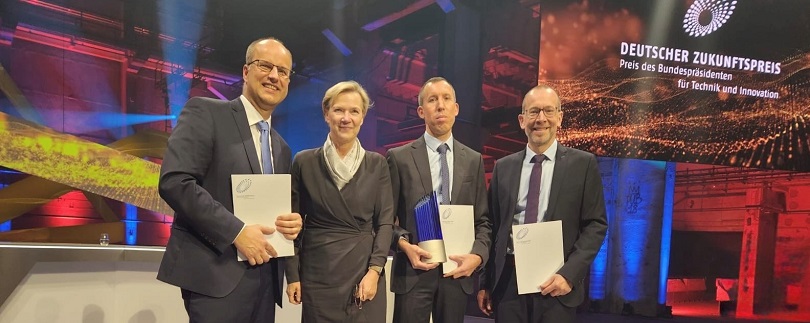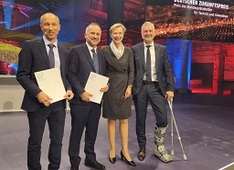Content
Deutscher Zukunftspreis 2025: DPMA President congratulates Robert Bosch GmbH team

DPMA President Eva Schewior and the winning team from Robert Bosch GmbH, Kai Weeber, Pierre Andrieu and Christoffer Uhr (from left to right)
Innovative, climate-friendly truck drive: Robert Bosch GmbH team awarded the Federal President's Future Prize – DPMA President: Important building block for the decarbonisation of our economy
Press release dated 19 November 2025
Berlin. The President of the German Patent and Trade Mark Office, Eva Schewior, congratulated the Robert Bosch GmbH team on winning the German Future Prize. ‘This innovative technology impressively demonstrates how heavy goods transport can also be operated in a climate-friendly manner,’ said the DPMA President. ‘The team has thus made an important contribution to the decarbonisation of our economy and highlighted the enormous potential of technical innovations for a sustainable way of life.’
Christoffer Uhr, Kai Weeber and Pierre Andrieu from Robert Bosch GmbH (Stuttgart) have developed a fuel cell technology that uses hydrogen to power trucks efficiently and without emissions. While batteries are a good solution for passenger cars, they are often not suitable for heavy goods vehicles. To deliver the required power, they would have to be very large and would then usually be too heavy and take too long to charge. Fuel cells, on the other hand, enable a long range, fast refuelling and a significantly higher payload.
Unlike battery-powered vehicles, which use the electricity stored in the batteries, a fuel cell generates electrical energy directly through the chemical reaction of hydrogen and oxygen to form water. The team has developed the entire drive train and a complex control system to match. This makes the drive system not only powerful, but also functional and economical under extreme conditions. Their system is already in series production and is used in several thousand trucks worldwide. However, for the solution to be truly environmentally friendly, the use of green hydrogen, i.e. hydrogen produced from renewable energies, is crucial.
The following teams were also nominated for the prize:

The team proposed by the DPMA and President Eva Schewior
Dr Mark Bischoff, Dirk Mühlhoff and Dr Gregor Stobrawa from Carl Zeiss Meditec AG (Jena) developed the procedure known as SMILE. It is an alternative to the previously most commonly used LASIK procedure and is becoming increasingly widespread. Both procedures can correct vision problems. In LASIK, a pulsed laser is first used to make a number of incisions in the cornea so that a flap, i.e. a strip of cornea, can then be laid to one side and a lenticule removed. This optimises vision, but side effects such as dry eyes can sometimes occur. In addition, the flap never grows back properly and can be mechanically displaced, for example when rubbing the eyes.
With the SMILE procedure, however, the surgeon does not need to cut a flap from the cornea. Instead, the lenticule is separated inside the eye using ultra-short laser pulses. Only a tiny incision is required to remove it. This changes the shape of the front of the cornea, thereby correcting the refractive power. As a result, ‘dry eyes’ occur less frequently and impairments due to mechanical effects are virtually eliminated. The procedure is made possible by a high-performance lens developed by ZEISS and extremely powerful laser beam control. The innovation was nominated for the Zukunftspreis by the jury on the recommendation of the DPMA.
Dr Anne Lamp, Sina Spingler and Niklas Rambow from traceless materials GmbH (Hamburg) have developed a natural and environmentally friendly alternative to plastic. Plastic has become an integral part of our everyday lives, but it is known to pose a major problem: when disposed of as waste, natural microorganisms cannot break it down. It therefore remains in the environment for hundreds to thousands of years, at least in the form of microplastics, polluting soil and oceans and posing a threat to human and animal health.
Instead of relying on chemically modified bioplastics, the team uses only molecules and polymers that occur naturally in plants, which are not chemically modified and are therefore biodegradable. The granulate produced from these can be used in existing machinery in the plastics industry, consuming even less energy in the process. Although it is not suitable for all products, such as those that need to be permanently water- or heat-resistant, it opens up new, sustainable possibilities for short-lived everyday items or packaging in online retail.
All three innovations are protected by numerous patents in various countries.
‘Even though only one team can be honoured, there are only winners at the Zukunftspreis,’ emphasised the DPMA President. ‘The winners are the outstanding teams whose developments are given a big stage. The winner is our business location, which receives new impetus. And we as a society are winners, because all examples show that protected innovations help to master social challenges and improve people's lives.’
Federal President Frank-Walter Steinmeier presented the award at a festive evening event at the Kraftwerk Berlin, which was also broadcast on ZDF with a time delay. Each year, an independent and high-ranking jury decides who wins the Deutscher Zukunftspreis – the Federal President's Award for Technology and Innovation. The award is presented annually and is endowed with 250,000 euros. DPMA President Eva Schewior is a member of the Board of Trustees, which proposes jury members to the Federal President for appointment and establishes guidelines for the selection of award winners.
The German Patent and Trade Mark Office
Inventiveness and creativity need effective protection. The DPMA is the German centre of expertise for all intellectual property rights – for patents, utility models, trade marks and designs. As the largest national patent office in Europe and the sixth largest national patent office in the world, it represents the future of Germany as a country of inventors in a globalised economy. Its approximately 2,800 employees at three locations – Munich, Jena and Berlin – provide services to inventors and companies. They implement the Federal Government's innovation strategies and further develop national, European and international protection systems.
Bilder: DPMA
Last updated: 19 November 2025

Not only protecting innovations
Social Media